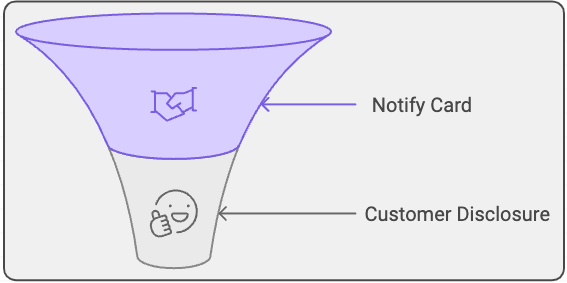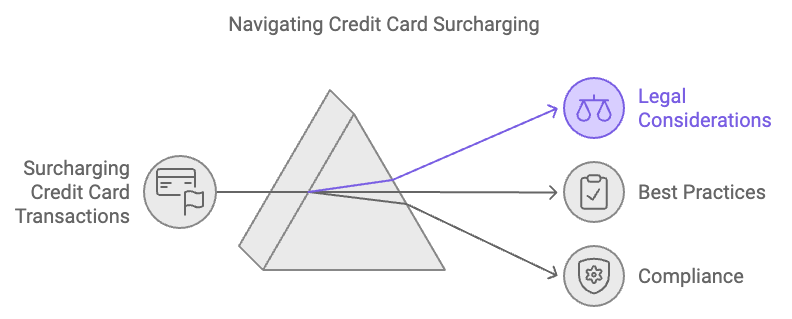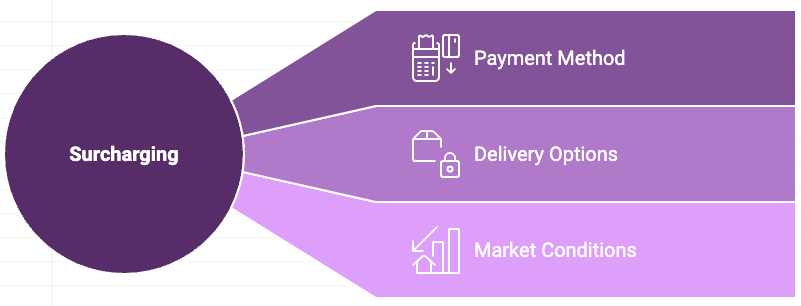Surcharging
Surcharging allows merchants to pass on the cost of taking a payment to the customer when a credit card is used.
Understanding Surcharging
In today’s business environment, credit card payment acceptance is more important than ever. Surcharging is a viable and legal option to help offset the increase in credit card usage.
Surcharging is a fee automatically added to the bill or sale when a credit card is used for payment to offset the cost of transaction fees and is passed on to the customer.
Even though surcharging is straightforward, many regulations are in place by state laws and card brands that must be followed. Only two states do not allow surcharging: Connecticut and Massachusetts.

Notifying the Card Brands
Mastercard requires merchants to submit a form notifying them of the intention to surcharge 30 days before the start date of surcharging. Merchants must fill out and submit the form to be surcharge compliant.
Our recommendation to partners is to include this Mastercard notification form as a next step in the post-application process, whether you send it via email or build it into your platform for merchants to access the link and fill it out.
Disclosure to Customers
Merchants must notify their customers of a surcharge on their payments. This is especially important for recurring payments, where customers may be accustomed to “setting it and forgetting it.” Making sure the customer understands that there is a surcharge will help reduce disputes and chargebacks.
- Card Present (in-person): Signage should be posted at the entrance and the Point of Sale location.
- Online: Clearly defined within the checkout flow.
- Over the Phone: The merchant must give a verbal notice before processing payments.

Surcharging Rules
- The surcharge cannot exceed 3% per Visa/Mastercard’s updated regulations.
- Please contact your leadership or the Stax team to determine the go-to-market rate at which your merchants are being charged.
- The rate must be the same for all card brands.
- The merchant cannot “profit” from the surcharge and only save money by passing off the fees.
- Surcharging ONLY applies to credit card transactions.
- Debit cards will be charged the rate determined by your pricing plan.
- A merchant cannot have both a surcharging and non-surcharging account.
- Every customer paying with a credit card must be treated the same, and all must be surcharged or non-surcharged.
- Processing costs are variable based on the type(s) of cards you accept, but don’t worry—we establish the percentage for you. Our industry-leading surcharge technology distinguishes credit from debit card types and automatically applies the surcharge rate to credit card transactions ONLY.

Implementing Surcharging
Once enabled, Stax Connect handles all of the implementation. Stax offers the technology that determines the card type and automatically adds the pre-set Surcharge amount displayed in Online and Card Present situations.
The surcharge amount and sale price are processed in one transaction. The surcharging amount should be displayed before processing and on the receipt. Once configured, Stax automatically places your surcharge amount within your payment types.
Debit cards, whether Visa/MC/Disc, even if run as credit, Gift Cards, or Prepaid cards, cannot be surcharged and will be run as debit.
Certain Amex gift cards can only be used as credit.
Note: We cannot charge Apple Pay, Google Pay, or PayPal transactions natively.
At Stax, our team will guide you through the enablement process, ensuring you are compliant, and advise on which surcharging payment acceptance solutions make sense for your merchants, from online payments and recurring billing to card-present (in-person) transactions.
Contact your Growth Manager or support team directly to discuss if Surcharging is right for you.
Updated 4 months ago
